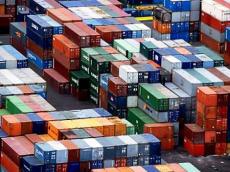|
|
TODAY.AZ / World news
Export-led growth: solution to support Iranian producers
10 October 2017 [11:27] - TODAY.AZ

By Trend
In a move aimed at extending support for domestic producers, Iranian government over the past decades has imposed serious restrictions on importing goods and commodities.
The country’s automotive industry is an example of the efforts to boost the domestic production. Although the automotive industry is the second biggest sub-sector of the Iranian economy after oil, the figures and stats on car imports suggest that the local carmakers have failed to earn the nation’s trust.
On the other hand Iran’s leading carmakers have put a great deal of effort in exporting a part of their output to the global markets, having reached only limited success.
While Iran’s auto industry exports registered a fall by 32 percent in terms of value and 20 percent in terms of volume during the first five months of the current fiscal year, the Islamic Republic imported $1.4 billion worth of vehicles and chassis from China in Jan-Aug. 2017.
This is while Iranian carmakers manufactured over 496,800 units over the first five months of the current fiscal year (starting March 20), an increase of 20 percent year on year.
"Given the stated goal of reaching a production level of 3 million cars with a million exported by 2025, the fall in export figures suggests serious underlying issues in the industry that almost certainly will fall substantially short of its export targets and the quality upgrading that is needed to achieve export expansion in the next eight years," Mehrdad Emadi, an economic expert and consultant at the UK-based Betamatrix International Consultancy, earlier told Trend.
?Some observers blame the government policies on supporting the domestic producers, suggesting that such policies have led the domestic manufacturers to produce expensive but sub-standard cars.
Over the past years, a group of Iranian consumers have joined a campaign to support domestic production through purchasing Iran-made goods but in the absence of a proper balance between quality and price the customers are very likely to walk away from the campaign.
In this situation, the country’s industrial policymakers apparently need to draw up new strategies to help the domestic producers to make high-standard goods at proper prices in order to reach the global markets.
URL: http://www.today.az/news/regions/165619.html
 Print version
Print version
Connect with us. Get latest news and updates.
See Also
- 04 December 2025 [23:50]
Georgia bans foreign students in public universities - 04 December 2025 [23:23]
Ankara to deploy voice-guided AEDs across public spaces under 2026 regulation - 04 December 2025 [22:23]
Kahramanmara? reconstruction accelerates with 52,000 homes delivered - 04 December 2025 [21:22]
Turkiye, Pakistan sign major hydrocarbon deals in landmark energy cooperation - 04 December 2025 [20:21]
Germany activates Arrow air defense - 04 December 2025 [09:00]
Rivian initiates US-wide vehicle recall - 04 December 2025 [08:00]
Google helps Circle detect scams - 03 December 2025 [23:55]
Travelers rank world’s cleanest cities - 03 December 2025 [22:25]
New Australian finding offers hope for better chemotherapy - 03 December 2025 [19:00]
Bannu terror attack: Assistant Commissioner Shah Wali Khan among four martyred
Most Popular
 The Trans-Caspian gas pipeline is coming back: and who will pay?
The Trans-Caspian gas pipeline is coming back: and who will pay?
 President Ilham Aliyev sends congratulatory letter to President of United Arab Emirates
President Ilham Aliyev sends congratulatory letter to President of United Arab Emirates
 Azerbaijan’s Central Bank delegation begins working visit to South Korea
Azerbaijan’s Central Bank delegation begins working visit to South Korea
 Drop by drop: what the situation in Iran reminded us about
Drop by drop: what the situation in Iran reminded us about
 ASAN Service marks 13 years of innovation as ASAN AI Hub officially opens
ASAN Service marks 13 years of innovation as ASAN AI Hub officially opens
 President Ilham Aliyev: Azerbaijan-UAE cooperation agenda covers a broad range of areas
President Ilham Aliyev: Azerbaijan-UAE cooperation agenda covers a broad range of areas
 Garegin organizes three-day sabbath
Garegin organizes three-day sabbath
